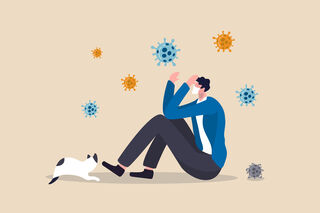Psychiatry
The Role of Psychological Distress in Long Covid
A study finds a “strong” association.
Posted October 4, 2022 Reviewed by Vanessa Lancaster
Key points
- Long COVID is a serious illness that's still hard to diagnose and understand.
- There are varying levels of understanding about the extent to which psychological distress plays a role in Long COVID.
- We must continue to try to better understand Long COVID and not equate psychological distress with fake illness.
In a study published last month in the journal JAMA Psychiatry, investigators from the Harvard T.H. Chang School of Public Health and Harvard Medical School reported that among individuals followed up for more than a year starting in April 2020, the presence of several types of psychological distress at baseline and before COVID-19 infection was “strongly associated” with subsequent development of Long Covid.
The researchers reported a strong association between preinfection psychological distress and symptoms of Long Covid, the illness that occurs in about 30 percent of people after they have recovered from COVID-19. Other data suggest that patients who have survived COVID-19 are at increased risk of developing psychiatric illnesses like depression and anxiety disorders.
We all know and agree that association is not causality. Therefore the authors of this study were careful not to say that psychological distress is a cause of Long Covid. Unpacking the study, however, makes it clear that this could be one possibility in some cases. The researchers used data from three large ongoing epidemiological surveys and included 54,960 participants in the study.
They assessed these study participants for psychological distress before they reported being infected with SARS-CoV-2, which causes COVID-19. They used a careful statistical analysis that controlled for many potentially confounding variables to find a strong association between depression, anxiety, worry, loneliness, stress, and subsequent Long Covid.
A Caveat From the Authors
Knowing that this finding is bound to spark controversy, the authors made a curious statement in the discussion section of their paper: “Our results should not be misinterpreted as supporting a hypothesis that post-COVID-19 conditions are psychosomatic.”
They listed several reasons for that assertion, including:
- More than 40 percent of the participants who developed Long Covid did not report psychological distress prior to developing COVID-19.
- Symptoms of Long Covid “differ substantially” from symptoms of mental illness.
- More than half of the patients reported relapses after physical exercise, whereas physical exercise is protective against relapses in many forms of psychiatric illness.
They explain potential biological links between psychological distress and Long Covid involving the immune system and inflammation, which we will return to in a bit. Somehow, the authors seem to want to reassure their readers that they do not regard Long Covid as in any way a “mental illness” or merely “psychosomatic.” Rather, they want us to be clear that there is biology underlying the association between psychological distress and Long Covid. Long Covid must be a “real” illness.
The authors are obviously responding to the long-standing debate about the causes of conditions that sociologists have called “contested illnesses,” a list that includes chronic Lyme disease, fibromyalgia, and chronic fatigue syndrome/myalgic encephalomyelitis.
These are illnesses for which traditional medical experts and patients often disagree about their “nature, causes, and treatments.” The authors of the JAMA Psychiatry paper noted that “Prior studies have further suggested that distress is associated with long-term symptoms after Lyme infection and in functional syndromes, e.g., chronic fatigue syndrome and fibromyalgia, that have symptoms similar to those of post-COVID-19 conditions, such as fatigue, headache, and muscle pain.
Yet any suggestion that these “functional” syndromes are linked in any way to psychological factors brings out an immediate outcry from patient advocacy groups, who say that making such a link is akin to asserting that these illnesses are “all in the head” and, therefore not real.

Advocates for people with conditions like Long Covid, chronic Lyme disease, and chronic fatigue syndrome are absolutely right to insist that the medical profession fully recognize the very real suffering these conditions impose and that patients who have them should be taken seriously and offered appropriate medical tests and interventions.
But it is important to remember that the same is also the case for people suffering from depression, anxiety disorders, and other sources of significant psychological distress. Trying to negate the possibility that conditions associated with psychological distress might be one cause of Long Covid has the effect of minimizing the reality of psychiatric illness.
Positing a Biological Basis
The authors of the JAMA Psychiatry paper do not want anyone to think that Long Covid is a “psychosomatic” disorder. This term is usually taken to mean a psychological condition in which the presence of physical symptoms is unexplained by a known medical illness.
To counteract this misunderstanding of their findings, they stated that “Inflammation and immune dysregulation may link psychological distress with post-COVID-19 conditions” and mentioned evidence that stress, depression, and other psychiatric illnesses, may activate a biological system called the hypothalamic-pituitary-adrenal axis. This system links a brain region, the hypothalamus, to the pituitary gland that sits at the base of the brain, to the adrenal glands, which are located on top of each kidney.
The activation of this axis results in an increase in several hormones linked to stress, including the adrenal hormone cortisol. Interestingly, cortisol suppresses immune function and has recently been shown to be decreased in patients with Long Covid. Hence, whether there really is a link between hypothalamic-pituitary-adrenal axis function, psychological distress, and Long Covid remains very much an open question.
Somehow, there is the idea here that if we can find a “medical” or “biological” reason for the association between psychological distress and Long Covid (or any other illness where psychological distress is relevant), then we have removed the association from the realm of mental illness.
The fact is, however, that we don’t know for sure the “biological” basis of either psychiatric conditions or of Long Covid. We have lots of data addressing this issue, and it is likely that some answers, at least in the case of Long Covid, will emerge soon. We do know that both are accompanied by significant suffering and disability.
We also know that both require careful attention from healthcare professionals. If it turns out that having a history of depression, anxiety disorder, or some other form of psychological distress increases the risk for Long Covid, we should be cautious in offering unproven hypotheses to explain that association. Rather, the new study tells us that psychiatrists, psychologists, and other behavioral healthcare professionals will undoubtedly play an important role in understanding and treating Long Covid.




